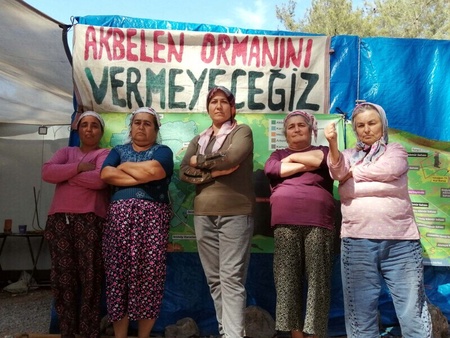The Journal of Gender Studies has published an article co-authored by Dr Digdem Soyaltin Colella, Lecturer in Politics and International Relations, and Dr Defne Gönenç (Middle East Technical University, Istinye University).
The article focuses on environmental resistance against land-grabbing in Akbelen Forest, a woodland in Muğla, southwest Turkey. It also shows how the EU’s climate agenda overlooks gender considerations and vulnerabilities of the local populations in favour of market-based solutions, undermining their reputation as a green, normative power.
Dr Soyaltin Colella, whose research focuses include the EU policies and politics of corporate governance, and Dr Gönenç, whose research focuses on environmental justice, brought their expertise together to approach the unjust outcomes of land-grabbing by corporations in Turkey from a gender perspective. Dr Soyaltin Colella explained “it is the women who bear the responsibility of using and managing natural resources, and thus face disproportionate vulnerability to the impact of climate change; yet it is challenging for local citizens, especially women, to participate in environmental decision-making processes.”
Drs Soyaltin Colella and Gönenç interviewed villagers, ecology advocates, activists, and experts in the villages of Ikızköy and Turgut, close to Akbelen Forest. These interviews illustrated that rural women who were previously excluded from the decision and policy-making processes have been empowered to become active ecology advocates and take part in discussions and decision-making processes at the local level.
They also spoke with Mrs Nejla Işık, a farmer who has been an active part of the Akbelen resistance for the past five years and was recently elected mukhtar, or village head, of İkizköy in the 2024 local elections. Mrs Işık was named on the BBC 100 Women 2024, an annual list of inspiring and influential women from around the world, for her dedication to the environmental campaign aimed at protecting Akbelen.
The anti-mining resistance in Akleben, Dr Soyaltin Colella says, illustrates “a long-lasting public mobilisation and an active local climate struggle where women play a leading role.” The article also demonstrates that the struggle against mining activities expanding into forests and villages is more widespread in the region, citing ongoing civic activism in Serbia and Bosnia and Herzegovina.
In showing how female activists gained a voice in a local environmental struggle in Turkey, where women’s participation in politics and business life remains low, Drs Soyaltin Colella and Gönenç believe the outcomes of their research can provide insights for regions experiencing environmental destruction and gender inequality, particularly in the Global South.
You can read the full article by Dr Soyaltin Colella and Dr Gönenç, “Ecofeminist struggle for epistemic recognition beyond the EU? The case of Akbelen Forest in Turkey,” online.


